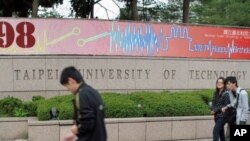The plan, which still requires the approval of Taiwan's parliament, will grant eligibility to Chinese students from 41 mainland universities.
Currently, Chinese university students can study at Taiwan universities for up to a year, but they can not earn degrees.
Taiwan's President Ma Ying-jeou sees the plan as another step toward improving relations with Beijing, which claims the island as its territory. Taiwan has been self-governed since 1949, when Nationalist forces fled there after their defeat by the Communists.
Beijing vows to eventually take control of the island, by force if necessary. For most of the past decade, relations between the two have been strained, but since taking office last year, Mr. Ma has taken several steps to improve them, such as allowing more mainland visitors.
Many Taiwan residents, however, are less concerned with relations with Beijing and more about whether the plan will increase competition for university admission and worsen the sluggish job market.
Deputy Minister of Education Lin Tsung-ming says restrictions on Chinese students will ensure that does not happen.
Lin says the primary quota set for Chinese students is about two percent of the total number of first year students. And, he says, the Chinese students will pay tuition equivalent to that charged by Taiwan's private universities.
After graduating, Chinese students will be barred from employment in Taiwan.
Because of different training requirements in Taiwan, Chinese medical student will not be admitted, and mainland students with military or intelligence training will also not be eligible.
Despite these barriers, Taiwan university administrators, especially those at the more expensive and less competitive private schools, hope the plan will help fill their classrooms. In some private university departments, enrollments are near zero.
Over the past decade, Taiwan went on a university building spree, even though the birth rate has been dwindling for years. The Population Reference Bureau, a Washington research group, ranks Taiwan as having the lowest birth rate in the world with eight births per 1,000 residents annually.
The government projects a third of Taiwan's universities will close by 2021 because of a shortage of students. But Ni Chou-hwa, a section chief at the Ministry of Education, says that is not driving the plan to open universities to mainland students.
Ni says the purpose of accepting Chinese students is to attract and nourish talent, and not to fill up vacancies at those private universities that have low enrollments.
Mainland students give mixed reviews of their experiences studying in Taiwan. Liu Jing-yu is a student at National Taipei University of Technology.
Liu says Taiwan has great facilities, better than China, but the students here do not seem to study hard enough.
Gong Yin, another mainland student at the university, says the higher cost of education in Taiwan would be a drawback if she were to return for a degree.
She says she would only consider spending lots of money to study in Taiwan if she did not do well on her college entrance exam. But, she says, if she needed to spend lots of money to go to school, why not just go to the United States?
The Ministry of Education's Ni says that Taiwan's schools are affordable. He says tuition at Taiwan universities ranges from $3,100 to $4,600 a year, compared with around $30,000 in the U.S and $20,000 in the United Kingdom.
And, he says, National Taiwan University, considered the best on the island, continues to outrank China's best universities. Taiwan, he says, has the ability to attract mainland students.
News
Taiwan Universities to Accept Mainland Chinese Degree Students
update

Taiwan universities plan to allow mainland Chinese students to pursue degrees for the first time next year. The move is the latest barrier to fall as China and Taiwan continue to improve ties.



